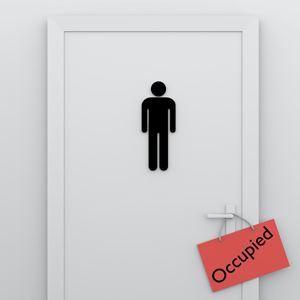No bathroom break allowed? Suit says rules for remote bar exam discriminate against disabled grads

Image from Shutterstock.com.
A lawsuit by law graduates who have disabilities says they will be forced to take the California bar exam in person because of a failure to provide accommodations for a remote test.
The lawsuit, filed Monday in San Francisco federal court, alleges that the in-person test puts the would-be lawyers at greater risk of contracting COVID-19, report Law.com, Bloomberg Law and Law360.
One problem, the suit says, is the requirement that test-takers must remain on a webcam for entire sections of the test. That means that applicants who get special time to take the test would be denied a restroom break for up to three hours.
One of the plaintiff has irritable bowel syndrome and needs bathroom breaks. Another says she can’t sit for long periods because of a cerebrospinal fluid leak. A third says the requirement for a computer exam is a problem for a plaintiff who needs a paper copy because of his attention deficit hyperactivity disorder.
The suit alleges violations of the Americans with Disabilities Act and California civil rights law.
The plaintiffs are Kara Gordon, Isabel Callejo-Brighton and a person identified only as John Doe. They are represented by Legal Aid at Work and the Disability Rights Education and Defense Fund.
The defendants are the State Bar of California and the National Conference of Bar Examiners.
The State Bar of California denied unlawful discrimination in a statement provided to Bloomberg Law.
“In order to fulfill its public protection mission, the State Bar of California must preserve the integrity and security of the exam while providing equal and safe access,” wrote Donna Hershkowitz, interim executive director of the State Bar of California. “Testing accommodations that fundamentally alter the nature of the exam are not required to be implemented. The COVID-19 protocols that will be in place for in-person administration of the bar exam for both disabled and nondisabled test-takers follow national and state public health guidelines to minimize the risk of infection spread during this unprecedented pandemic.”



